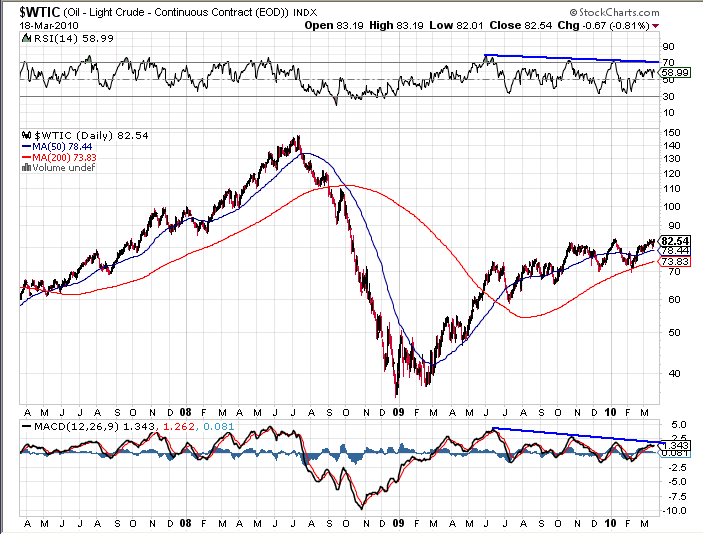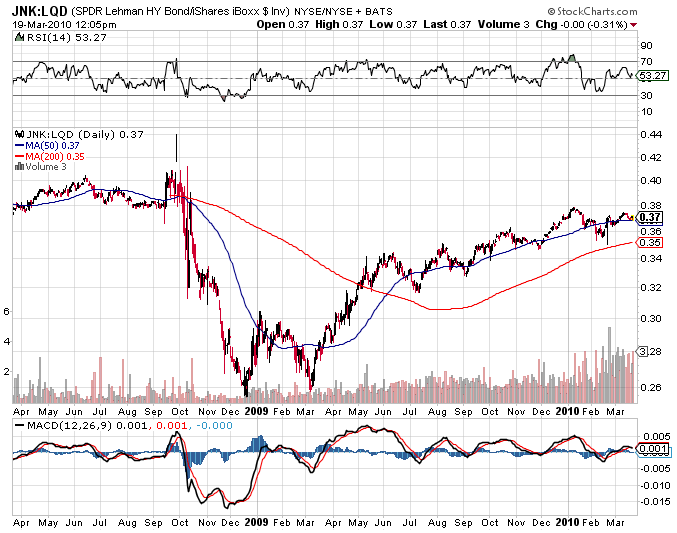The recovery of the US stock indexes and big new highs in the Russell 2000 and Nasdaq seem to have convinced a lot of people that we are either entering the next phase of a sustainable bull market, or about to at least crawl up another 10% before finally exhausting. I don’t see it that way. This feels to me like October 2007, when the market had smartly recovered from a hard break on the leadership of the secondaries, but the trend had been broken and stocks were strenuously overbought on extreme complacency.
This rally has mostly been a small-cap, tech stock and speculative affair. Larger stocks are not getting the same kind of bid, nor are commodities.
I have turned very short-term bearish this week on the extreme low in the equity put:call ratio. You can see here that the 10-day moving average is lower than at any point in the last three years, which at 0.51 might actually be the lowest ever (since this includes the Goldilocks spring of 2007):
Indexindicators.com
How could you possibly be long given a reading like this?
Before concluding that we are blasting off here, take a look at oil, which has gone nowhere for five months, with each advancing impulse weaker than the last, and the latest looking particularly anemic:
Stockcharts.com
Even gold and silver, which have dependably found a strong bid whenever stocks have rallied and even when they have not, have stalled out well under their fall highs:
-
Silver is weaker than gold, and this measure of risk appetite (silver:gold ratio) peaked all the way back in September:
-
Perhaps the greatest beneficiary of the risk impulse has been the junk credit market, which by one measure is actually showing the narrowest spreads in history over quality. This is absolutely astounding given the economic conditions, and only explainable by the notion that the investing public, twice burned by stocks in the last decade, has decided that bonds are safe, without making any distinctions among them. You can see this trend here in the ratio of the price of JNK (junk bond ETF) to LQD (investment grade bond ETF), though this chart appears to show waning momentum:
-
I’m not calling for an immediate crash, but certainly at least for a smart set-back, which may in retrospect turn out to be the start of a decline to new secular bear market lows. With the credit system still clogged with bad debt at the personal, corporate and state level, the economy simply has no ground from which to launch a new phase of business growth. What we have seen for the last year is simply unsustainable government spending and an overeager investing public that still trusts Keynesian economists and bogus statistics like GDP.
We are not out of the woods. We are entering a long phase of write-downs, defaults, bankruptcies and generaly frugality. We are not going to get away this time without our Schumpeterian event.






Hi Mike
we get confused by news here in Greece with different decisions every day. It is an unprecedented situation here, all people wonder what’s going to happen. Couple of months ago the petrol price was 1 euro per litter now it is 1.50 euros per litter.
What do you think, are we going to default and get back to Drachma?
Cheers
Alex from Greece
Hi Alex,
I always appreciate your notes from Greece.
The country will have to default, one way or another, simply because the debt is too large to be paid back. This can be delayed through emergency loans, but then those are simply added to the debt balance.
The best thing would be to default right away and get it over with. The government would then not be able to borrow as much, and its interest would be higher, so it would be forced to fire lots of useless workers and lower the salaries of the rest.
The taxpayers would be better off because they would not have to pay higher rates to pay back the debt.
Default does not autmatically mean that Greece stops using the Euro. Why would it? Greece can choose to use any currency it wants: euros, dollars, drachmae, gold staters, whatever. Panama uses US dollars, Zimbabwe uses all kinds of currency, and FSU countries often use euros and dollars.
Anyway, I sure hope you default swiftly, but it doesn’t look like your politicians are going to do that. They are trying to get more loans and squeeze people dry, since the current status keeps them in power.
Best of luck,
Mike
Mike–I agree with you-not just Greece though–all of us–
Thanks for all the informative posts-you provide-
Mike
thanks your reply, i really appreciate your advice.
Alex
I think on more reason Greece will not default now, is that Greek banks must have bought CDS for the Greek debt.
For example a Greek Bank, TT, had bought 1 m euros Greek CDS last August.
That’s interesting. How smart of them. But if they are net short Greek debt with CDS, that would mean they would want default.
Anyway, my guess is still that Greece will get emergency guarantees or loans that will delay default. But a year from now when Italy, Spain, Portugal and Ireland are in the same position, it will be very difficult to bail everyone out, so real defaults will happen in the end.
Since I started reading this blog, some nine minutes ago, the US national debt has increased by nearly $27 million.
How much longer until the US is where Greece is now?